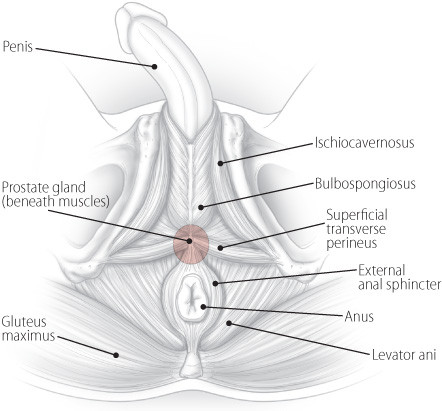
5 timeless habits for better health

What are the symptoms of prostate cancer?

Is your breakfast cereal healthy?

When pain signals an emergency: Symptoms you should never ignore

Does exercise give you energy?

Acupuncture for pain relief: How it works and what to expect

How to avoid jet lag: Tips for staying alert when you travel

Biofeedback therapy: How it works and how it can help relieve pain

Best vitamins and minerals for energy

Should you take probiotics with antibiotics?
Harvard Health Blog
Read posts from experts at Harvard Health Publishing covering a variety of health topics and perspectives on medical news.
Articles
What is magnetic resonance imaging (MRI)?
This imaging technique, which uses a powerful magnet and a computer to generate pictures of the body’s organs and tissues, can be used to diagnose prostate cancer or pinpoint the tumor’s location.
Cancer prevention trial (SELECT) comes to a halt
The National Cancer Institute discontinued the study after finding evidence that selenium and vitamin E supplements did not prevent prostate cancer.
Intermittent hormone therapy: A patient’s story
The jury is still out on whether intermittent hormone therapy, which involves repeated cycles of hormone therapy followed by breaks in treatment, might help patients live longer than continuous hormone therapy. But Patrick Kirby’s story might help patients who are debating various options in hormone therapy.
Hematospermia demystified
Spotting blood in your semen can be worrisome, but it’s usually not cause for alarm.
New options for treating erectile dysfunction
Penile rehabilitation, which typically consists of oral or injected medications, alone or with other interventions, may help restore erectile function after treatment for prostate cancer. However, this therapy remains controversial.
Erectile dysfunction and heart disease: What’s the connection?
Even if your doctor has given you a clean bill of health, beware: problems getting or keeping an erection firm enough for sexual intercourse may signal trouble, especially cardiovascular disease, down the road.
Harvard experts discuss benign prostatic hyperplasia drug treatments
Three Harvard doctors talk about who needs to be treated for BPH, what medications should be prescribed, and what side effects you need to be aware of.
Your benign prostatic hyperplasia medication: When to consider a change
A look at treatment options and trade-offs
If you are like many of the 14 million men in the United States who have been diagnosed with benign prostatic hyperplasia (BPH), you’ve probably been taking the same medication, at the same dose, for years. If so, consider the experiences of two patients, both of whom were taking some type of medication for BPH. Their names have been changed, but all other details are accurate (see “Jack Muriel” and “Henry Banks”).
Treating erectile dysfunction with penile implants
Penile implants, an option patients with erectile dysfunction probably hear little about, might offer a lasting and satisfying “cure.” Abraham Morgentaler, M.D., director of Men’s Health Boston, explains how.
Strength training exercises
Regular physical activity can help keep you — and your prostate — healthy
By now, we’ve all heard about the value of exercise in maintaining good health. Literally hundreds of studies conducted over more than half a century demonstrate that regular exercise pares down your risk of developing some deadly problems, including heart disease, stroke, and certain types of cancer (colorectal cancer, for example). It also eases the toll of chronic ailments like high blood pressure, diabetes, and arthritis.
Eating for prostate health (Part 1 of 2)
Two registered dietitians from Harvard-affiliated hospitals tout the benefits of fruits, vegetables, and whole grains
“What can I eat to reduce my risk of developing prostate cancer?” That’s one of the most common questions physicians hear from men concerned about prostate health. Undoubtedly, many hope to hear their doctor rattle off a few foods guaranteed to shield them from disease. Although some foods have been linked with reduced risk of prostate cancer, the proof is lacking, at least for now.
A patient’s story: Overcoming incontinence
How one man persisted for almost two years in an effort to remedy one of the most bothersome possible side effects of prostate cancer treatment, and what men facing therapeutic decisions can learn from his experience.
Androgen-independent prostate cancer
When cancer advances despite primary hormone therapy
We often hear the term prostate cancer and assume it is one disease. Practically speaking, it is. On a molecular level, however, scientists are revealing a far more complex picture. Cancer has an innate ability to adapt to its surroundings. As it progresses, cancer cells tend to change, morphing to a point where the differences between tumor cells can be dramatic. That’s why some researchers believe late-stage prostate cancer is more accurately described as a mix of cancer cell types.
How to handle a relapse after treatment for prostate cancer
Marc B. Garnick, M.D., discusses what biochemical recurrence means and what your options are.
Maintaining physical and emotional health during prostate cancer treatment: A patient’s story
Mr. Williams, a successful business owner in his mid-60s, describes how he was able to maintain his sex life and other aspects of his physical emotional well-being during and after treatment for prostate cancer.
Possible complications of hormone therapy
Three Harvard-affiliated physicians discuss the impact that hormone therapy can have on bones and cardiovascular health.
Intermittent hormone therapy for prostate cancer
Marc B. Garnick, M.D., discusses this therapy, which aims to strike a balance between effective treatment and quality of life.
Hormone therapy for prostate cancer
Marc Garnick, M.D., Editor in Chief of the Annual Report on Prostate Diseases, discusses what you need to know about therapy: when it’s used, what your options are, and what doctors disagree about.
Early-stage prostate cancer: Treat or wait?
When it comes to early-stage prostate cancer, there is no evidence that one treatment is better than another or that any treatment at all actually prolongs life. If you are diagnosed with early-stage prostate cancer, you’ll want to consider factors such as your values, your quality of life, and the potential side effects of various treatments before making a decision.
Understanding your prostate pathology report
Not all pathology reports are created equal. In fact, they can vary widely even within a single institution. Learn what your report should contain, what it means, and why asking questions about it can lead to better care.
Improved magnetic resonance imaging (MRI) may aid detection of prostate cancer
Dr. Neil Rofsky, of Harvard’s Beth Israel Deaconess Medical Center, discusses MRI technology, which patients might benefit from it, and the relative advantages and disadvantages of MRI as compared with other imaging modalities.

5 timeless habits for better health

What are the symptoms of prostate cancer?

Is your breakfast cereal healthy?

When pain signals an emergency: Symptoms you should never ignore

Does exercise give you energy?

Acupuncture for pain relief: How it works and what to expect

How to avoid jet lag: Tips for staying alert when you travel

Biofeedback therapy: How it works and how it can help relieve pain

Best vitamins and minerals for energy

Should you take probiotics with antibiotics?
Free Healthbeat Signup
Get the latest in health news delivered to your inbox!
Sign Up






